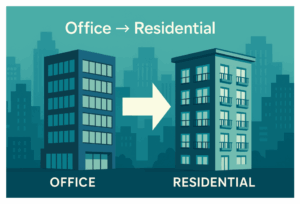What does CRE mean in investment?
Commercial Real Estate (CRE) refers to properties used exclusively for business purposes, such as office buildings, shopping centers, warehouses, and hotels. Unlike residential real estate, CRE investments focus on business-use properties that generate income through rent or lease agreements.
Why invest in CRE?
- Stable Income Stream: CRE properties often have longer lease agreements than residential properties, ensuring a consistent revenue stream.
- Asset Appreciation: Over time, commercial properties can appreciate in value, offering potential capital gains.
- Diversification: Adding CRE to your investment portfolio can diversify risk, as it may not correlate directly with other asset classes.
- Hedge Against Inflation: As inflation rises, so can rental income, making CRE a potential hedge against inflation.
- Tangible Asset: Real estate is a physical asset, providing a sense of security compared to intangible investments.
What is a CRE portfolio?
A CRE portfolio comprises a collection of commercial real estate properties an investor owns. This portfolio can include a mix of office spaces, retail locations, industrial properties, and more. By diversifying the types of properties within a CRE portfolio, investors can spread risk and potentially increase returns.
What is CRE investment banking?
CRE investment banking involves providing financial services and advice related to commercial real estate transactions. Investment banks may assist in structuring deals, sourcing capital, and providing strategic advice to clients. This can include mergers and acquisitions, refinancing, or raising capital for CRE projects.




